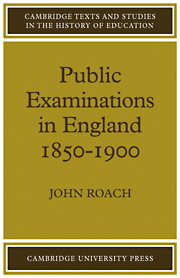Book contents
- Frontmatter
- Contents
- Dedication
- Preface
- List of abbreviations
- PART I THE COMPETITIVE PRINCIPLE ESTABLISHED
- PART II THE OXFORD AND CAMBRIDGE LOCALS AND NATIONAL EDUCATION, 1857–1900
- PART III THE PUBLIC CONTEXT, 1855–1900
- 8 The Civil Service Examinations: to 1870
- 9 The Civil Service Examinations: after 1870
- 10 School Examinations – from Taunton to Bryce
- 11 Critics and criticisms
- Bibliography
- Index
8 - The Civil Service Examinations: to 1870
Published online by Cambridge University Press: 07 October 2011
- Frontmatter
- Contents
- Dedication
- Preface
- List of abbreviations
- PART I THE COMPETITIVE PRINCIPLE ESTABLISHED
- PART II THE OXFORD AND CAMBRIDGE LOCALS AND NATIONAL EDUCATION, 1857–1900
- PART III THE PUBLIC CONTEXT, 1855–1900
- 8 The Civil Service Examinations: to 1870
- 9 The Civil Service Examinations: after 1870
- 10 School Examinations – from Taunton to Bryce
- 11 Critics and criticisms
- Bibliography
- Index
Summary
In the concluding section of this study the consequences of the crucial decisions taken in the 1850s must be assessed. The first topic to be considered is the development of the Civil Service Examinations. The administrative reforms of the fifties had been launched into stormy waters. In India the new system had hardly begun when the Mutiny of 1857 broke out and the rule of the Company was brought to an end. In England the shock caused by the administrative failures of the Crimean War was serious. One expression of public criticism was the Administrative Reform Association. The new body proclaimed its intention of shutting ‘all the back doors which lead to public employment’ and ‘throwing the public service open to all England’. Events moved at very different speeds in India and at home. The creation in 1855 of the Civil Service Commission was a very partial victory for reforming principles in administration, and techniques of examination, in so far as they were applied at all, were applied in England to only a small degree, and at a low level of performance. In India the new system came into effect at once. Like the Chinese Imperial Service, the rulers of India were to be selected on the basis of their proficiency in the highest academic culture of their native land. Power and influence were to be gained by skill in purely literary tests, and practical achievement was expected to follow from intellectual skill. A corps d'élite recruited by success in examinations ruled in China for over a thousand years.
- Type
- Chapter
- Information
- Public Examinations in England 1850–1900 , pp. 191 - 209Publisher: Cambridge University PressPrint publication year: 1971



